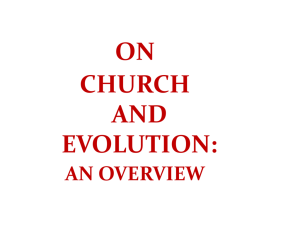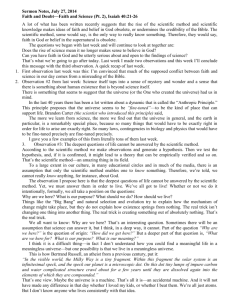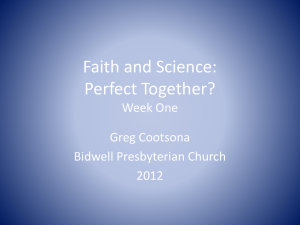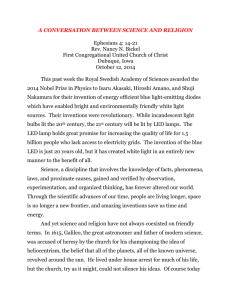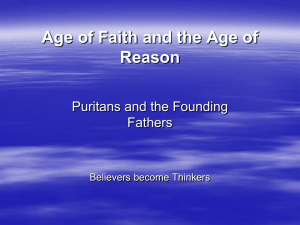7-20-14 Sermon Notes
advertisement
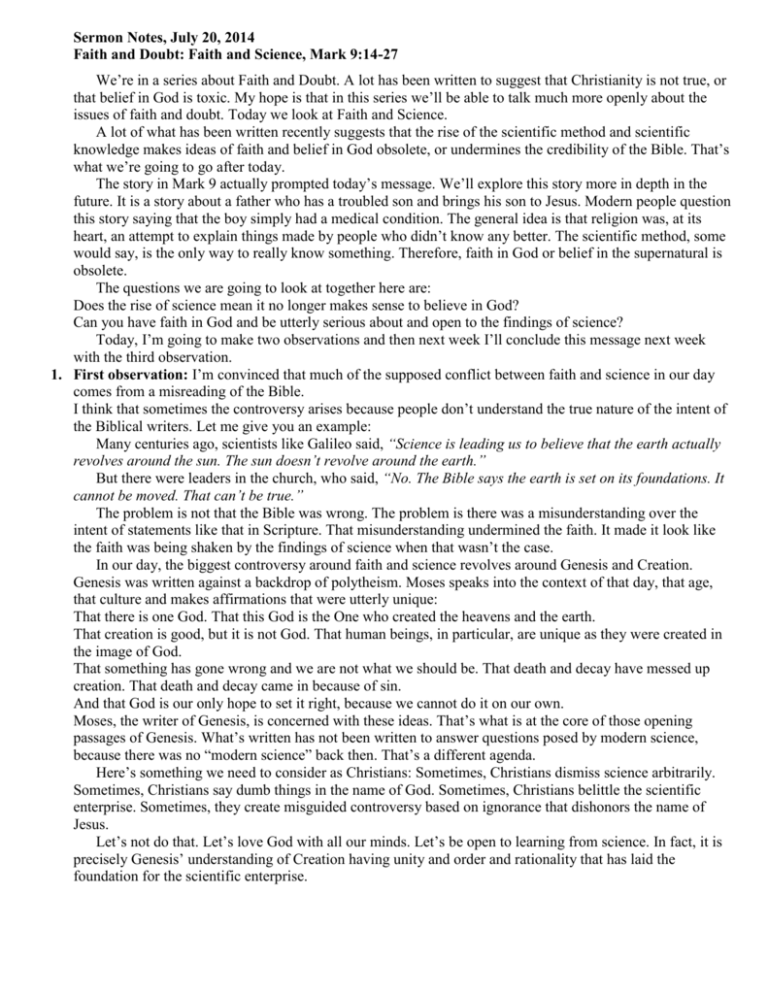
Sermon Notes, July 20, 2014 Faith and Doubt: Faith and Science, Mark 9:14-27 We’re in a series about Faith and Doubt. A lot has been written to suggest that Christianity is not true, or that belief in God is toxic. My hope is that in this series we’ll be able to talk much more openly about the issues of faith and doubt. Today we look at Faith and Science. A lot of what has been written recently suggests that the rise of the scientific method and scientific knowledge makes ideas of faith and belief in God obsolete, or undermines the credibility of the Bible. That’s what we’re going to go after today. The story in Mark 9 actually prompted today’s message. We’ll explore this story more in depth in the future. It is a story about a father who has a troubled son and brings his son to Jesus. Modern people question this story saying that the boy simply had a medical condition. The general idea is that religion was, at its heart, an attempt to explain things made by people who didn’t know any better. The scientific method, some would say, is the only way to really know something. Therefore, faith in God or belief in the supernatural is obsolete. The questions we are going to look at together here are: Does the rise of science mean it no longer makes sense to believe in God? Can you have faith in God and be utterly serious about and open to the findings of science? Today, I’m going to make two observations and then next week I’ll conclude this message next week with the third observation. 1. First observation: I’m convinced that much of the supposed conflict between faith and science in our day comes from a misreading of the Bible. I think that sometimes the controversy arises because people don’t understand the true nature of the intent of the Biblical writers. Let me give you an example: Many centuries ago, scientists like Galileo said, “Science is leading us to believe that the earth actually revolves around the sun. The sun doesn’t revolve around the earth.” But there were leaders in the church, who said, “No. The Bible says the earth is set on its foundations. It cannot be moved. That can’t be true.” The problem is not that the Bible was wrong. The problem is there was a misunderstanding over the intent of statements like that in Scripture. That misunderstanding undermined the faith. It made it look like the faith was being shaken by the findings of science when that wasn’t the case. In our day, the biggest controversy around faith and science revolves around Genesis and Creation. Genesis was written against a backdrop of polytheism. Moses speaks into the context of that day, that age, that culture and makes affirmations that were utterly unique: That there is one God. That this God is the One who created the heavens and the earth. That creation is good, but it is not God. That human beings, in particular, are unique as they were created in the image of God. That something has gone wrong and we are not what we should be. That death and decay have messed up creation. That death and decay came in because of sin. And that God is our only hope to set it right, because we cannot do it on our own. Moses, the writer of Genesis, is concerned with these ideas. That’s what is at the core of those opening passages of Genesis. What’s written has not been written to answer questions posed by modern science, because there was no “modern science” back then. That’s a different agenda. Here’s something we need to consider as Christians: Sometimes, Christians dismiss science arbitrarily. Sometimes, Christians say dumb things in the name of God. Sometimes, Christians belittle the scientific enterprise. Sometimes, they create misguided controversy based on ignorance that dishonors the name of Jesus. Let’s not do that. Let’s love God with all our minds. Let’s be open to learning from science. In fact, it is precisely Genesis’ understanding of Creation having unity and order and rationality that has laid the foundation for the scientific enterprise. Rodney Stark, who earned his PhD at Berkeley, has authored a very interesting book called The Victory of Reason. In it, Stark says: “It is not an accident that real science arose only one time, in only one place, at the end of the Middle Ages, in Europe, in the context of a Christian worldview that saw nature as the product of a rational God, and therefore, set to explore that in the expectation of finding unity and order in a way that knows and glorify that God made sense.” A Christian worldview was part of the environment that was necessary for the rising of modern science, which didn’t happen anywhere else. I believe that not only is it not incompatible with science, but the Bible, when understood correctly, should not be threatened by science. Christianity was, in fact, one of the factors that made the rise of science actually possible. 2. Observation #2: Science itself taps into a sense of mystery and wonder and a sense that there is something about human existence that is beyond science itself. There is something that seems to suggest that the universe (or the One who created the universe) had us in mind. Over the last 40 years, there has been a lot written about a dynamic that is called the “Anthropic Principle.” This principle proposes that the universe seems to be “fine-tuned”—to be the kind of place that can support life. The scientist Brandon Carter, who coined this term, said, “The more we learn from science, the more we find out that the universe in general, and the earth in particular, is a remarkably special place, because so many things that would have to be exactly right in order for life to arise are exactly right. So many laws, contingencies in biology and physics that would have to be fine-tuned precisely are fine-tuned precisely.” I’ll only give you a few examples of this, but there are tons of them: The proportion of the mass of a neutron of hydrogen that is converted into energy in nuclear fusion is called a “strong force.” The value of this is 0.007. Double zero seven. (Does that number ring a bell with anybody?) That’s the “strong force.” It turns out that if that value were just a tiny bit different—if it were 0.006—then the whole universe would be hydrogen, and there would be no life. If it were the tiniest bit larger—0.008— then all hydrogen would be converted. There would be no hydrogen at all, and there would be no life. The “strong force” would have to be precisely 0.007 for our universe to produce life, and it just happens that that’s what it is. On and on, in the universe, on our planet, in biology and physics—all these things would have to be finetuned for life to exist. And it turns out they are exactly fine-tuned. Here’s a quote by Fred Hoyle, the scientist who coined the phrase, “Big Bang”: “The probability of life originating on earth is no greater than the chance that a hurricane sweeping through a scrap-yard would have the luck to assemble a Boeing 747.” A Christian scientist and astronomer named Hugh Ross writes this: “The universe is incredibly massive. Nevertheless, its mass must be spectacularly fine-tuned for life to be possible... The required fine-tuning is so extreme (one part in a quadrillion quadrillion quadrillion quadrillion) that if one were to remove or add a single dime's worth of mass to this vast cosmos, the balance of the observable universe would be thrown off and physical life would not be possible. Such amazing finetuning suggests the involvement of a supernatural, super intelligent Creator.” Maybe, just maybe physicists are reading a new chapter in the book that was opened by the Psalmist (Psalm 19:1-2) a long time ago that says: “The heavens declare the glory of God, and the skies proclaim the work of his hands. Day after day they pour forth speech. Night after night, they display knowledge.” Those aren’t just pretty words. It is not just poetry. This represents some very deep thinking about the nature of the way things are. In fact, as Scripture teaches nature (and indeed, science) should lead us to belief in God and His glory as Creator, and therefore every person who can perceive nature (even through science) is accountable to honor God and thank Him. Listen to what Paul says in Romans 1:19–20. He says, "Since what may be known about God is plain to them, because God has made it plain to them. Ever since the creation of the world God’s invisible qualities—namely his eternal power & divine nature—have been clearly seen, being understood from what has been made, so that men are without excuse." Yet, I need to tell you, if I did not have the witness of Scripture and the historical evidence of Jesus' life and resurrection, at least for me, science or nature would be a sufficient argument to cause me to believe in God, but if left to science or nature alone I would still be left in my sins.

